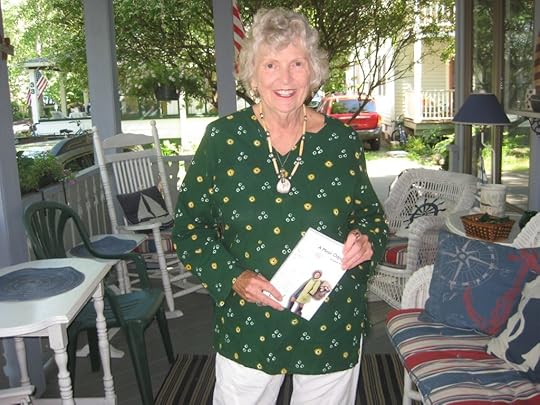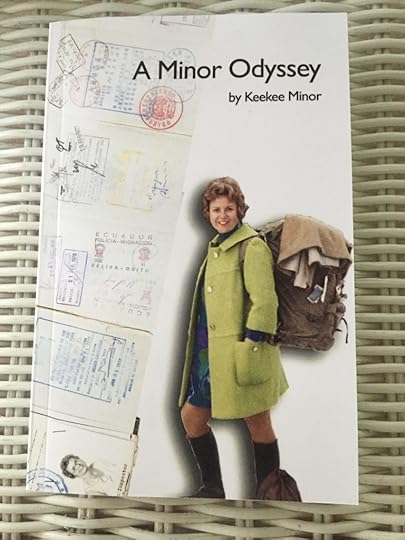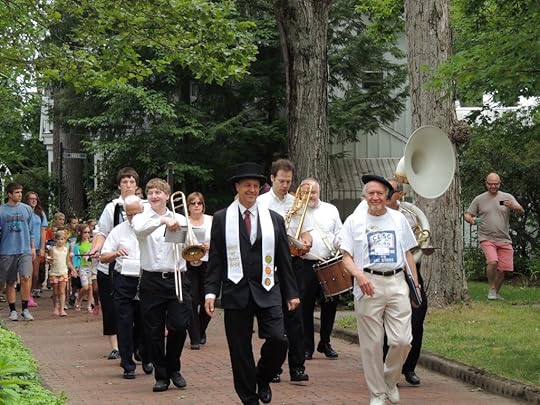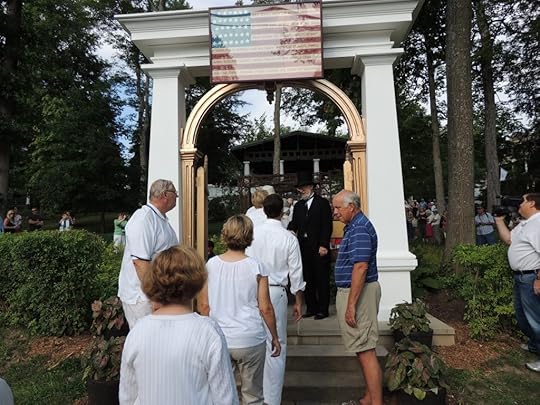Emilie Richards's Blog, page 67
August 27, 2016
Sunday Inspiration: Jazz & Life
“I’ve always told the musicians in my band to play what they know and then play above that. Because then anything can happen, and that’s where great art and music happen.” – Miles Davis
It’s Jazz Week at Chautauqua, and the music is fabulous. Wynton Marsalis and his Lincoln Center Jazz Orchestra are blowing away the large, enthusiastic crowds.
The other day I heard this quote by Miles Davis that seems to be about life as well as jazz. I certainly want to play above what I know in my writing and my relationships and my spirituality. Don’t you?
Like a good jazz musician, I would like to soar above the commonplace, not only achieving harmony with those with whom I collaborate but also to seek something unique and transcending.
Jazz: you either dig it or you don’t.
How about you?
The post Sunday Inspiration: Jazz & Life appeared first on Emilie Richards.
August 25, 2016
Is It Time to Write Your Own Book?
 Our wonderful neighbors across the street gave a “new book” party several weeks ago.
Our wonderful neighbors across the street gave a “new book” party several weeks ago.And, no, while everyone in our neighborhood has been unfailingly supportive of my writing career, this one wasn’t for me. The author was Keekee Minor, who just published her memoir, A Minor Odyssey.
Keekee told us two years ago that she had been working on essays about her life and planned to put them in a book. She wasn’t just slapping them together, either. She was carefully piecing together facts by contacting old friends, finding the right photos to illustrate her adventures, and editing and re-editing with the help of several friends, including my husband and me. She took her time and made sure everything wasn’t only correct, but fascinating, too. Not that the “fascinating” part was difficult, because Keekee has lived a fascinating life, all over the world.
I haven’t read the entire book yet. Somehow I started in the middle where Keekee and friends sailed through the Bermuda Triangle during a huge tropical storm.
This is Keekee at her best, an adventurer who hitchhiked through Europe and the Middle East at a time when this really wasn’t done, especially by young, beautiful women. Somehow she was right there on scene when so many riveting historical events occurred. She was and is fearless. And frankly, even though I KNEW she was sitting on a porch catty corner to my own as I read about her trials in the Bermuda Triangle, I couldn’t see how she was going to get out of that alive.
 Keekee was more careful about editing than most because she’s dyslexic.
Keekee was more careful about editing than most because she’s dyslexic.You say you can’t write? Dyslexia never stopped Keekee from doing anything she really wanted, including writing an insightful article about dyslexia for the Washington Post some years ago. Despite the difficulties Keekee just forged ahead, and her memoirs, which went into print through Amazon’s great CreateSpace program, are a joy for all her friends and family to have and savor.
Now my husband, Michael, is working on his. Someday I’d like to write my own.
So here’s my question to you. Why aren’t you writing your memoirs? I mean, really? It’s time to write your own book.
Why not?
“Oh, I don’t have anything to say. I lived an ordinary life.”
Is that your excuse? Nobody will want to read it?
Well, you’re wrong there. I can’t tell you how many memoirs I’ve devoured about “ordinary” people as I researched different professions, lifestyles, settings. And what is a blog, after all, but the recounting of ordinary moments in the lives of ordinary people. And yet blogs flourish and memoirs are published by the hundreds every day, sometimes to land on bestseller lists.
The thing is? You’re interesting!
Your life is interesting and unique to you. And even if you don’t achieve bestsellerdom, the people who love you, and let’s face it, people who never had the opportunity to know you, will enjoy learning about you. Someday a grandchild or a grandniece will pick up your story–or download it–and sink into a different time in history and feel a strong connection with a family member from their past.
Or someone completely unrelated will find it and learn how much we all share, no matter when we lived.
Every person in the world has something unique about them, something they never considered to be interesting. An insight, an experience, a value they hold dear.
You are among them.
I’m told frequently that readers are “waiting for my next book.”
So now? I’m waiting for yours, sweet readers. Tell the world about your life, at least the parts you feel like divulging. If two people or two million read it, does it matter? Google “writing your memoir” to find help getting started. Or just start at the beginning and tell your most interesting anecdotes.
Tell your story. Write your own book.
Judging from Keekee’s pleasure in telling hers, I can say that you won’t be a bit sorry, nor will the people who love you. Their lives will be richer and so will yours.
The post Is It Time to Write Your Own Book? appeared first on Emilie Richards.
August 20, 2016
Sunday Inspiration: Saved by Love
Nothing that is worth doing can be achieved in our lifetime; therefore we must be saved by hope.
Nothing which is true or beautiful or good makes complete sense in any immediate context of history; therefore we must he saved by faith.
Nothing we do, however virtuous, can be accomplished alone; therefore we are saved by love.
No virtuous act is quite as virtuous from the standpoint of our friend or foe as it is from our standpoint. Therefore we must be saved by the final form of love, which is forgiveness.
-Reinhold Niebuhr
The post Sunday Inspiration: Saved by Love appeared first on Emilie Richards.
August 16, 2016
What Writers Can Learn From The Olympics
 There they were, beautiful female athletes from the wide world over, mounting the balance beam at the Olympics to do their routine in front of an arena of fans plus, well, everyone, everywhere, who was watching them.
There they were, beautiful female athletes from the wide world over, mounting the balance beam at the Olympics to do their routine in front of an arena of fans plus, well, everyone, everywhere, who was watching them.“Whoops, the judges will subtract a point for grabbing the beam that way.” (To keep from falling off and possibly injuring herself.) “It’s going to cost her. She didn’t do that in practice, I’m really surprised.” (Not me, who couldn’t heft myself up on the darned beam, much take one step, if my life depended on it.) “Maybe it’s the pressure.” (You think?)
While I understand the need for judges to have standards by which to choose medalists, this Olympics season I find myself annoyed with commentators.
In these days of 24 hour news coverage, both journalists and announcers are required to keep talking even when they have nothing useful to say–which far too often is the case. And rambling on invariably morphs into making judgments, because what else is there?
As one who sits there, chin on the ground, as these young women perform death-defying feats without breaking a sweat, I’m beginning to take the volleys of criticism personally. What effect must it have on the athletes? Does it make them perform better, or when it’s extreme, does it strip the life from their routines because they are so afraid they’ll be judged?
The constant stream of negativity has me considering the effects of criticism on creativity, the joy of performing, and the desire to compete.
My latest novel, When We Were Sisters, came out in June. The reviews have pleased me, and RT Book Review made the book a top pick for the month. Not all the reviews are positive, of course, although taken in the proper spirit, all but the most nonsensical can be helpful. All these books later I’ve developed a thick skin, and I can see beyond what reviewers say, to what they “may” mean and how, if I want to, I can improve as a writer.
For instance it’s clear from some of the reviews that books written in 1st person point of view are not the reviewer’s cup of tea. And this book, with three narrators, sometimes confuses them. Readers who want a fast paced adventure aren’t as pleased with first person, either, since sifting through the narrator’s thoughts often means a slower novel, with more introspection–because hey, we’re hiking through somebody’s cerebral cortex.
I recently read a beautiful novel, written in first person. I stopped and reread sentences to savor them because they were so delicious. The narrator’s thoughts and the description were not overwrought but perfectly expressed. But action? From the reviews, those who wanted more story and faster, were unhappy enough to say so.
Last night on the balance beam different styles emerged.
Some of the gymnasts were graceful and thin. They danced and posed, and their complicated routines looked effortless. Others were stockier and athletic, in perfect control of every muscle and prone to the most challenging moves. I am sure every onlooker appreciated one style over the other. Viewers know what they like.
Without praise or criticism athletes and artists might not know where their strengths or weaknesses lie.
If we don’t know that we aren’t meeting expectations, we can’t improve. On the other hand, too much criticism–especially for athletes who are still as young as these gymnasts–may inhibit their performance. If a writer tries to write for a certain audience, she loses her individual voice and probably ends up pleasing nobody. If an athlete worries that every move won’t please her critics, she’ll stop moving at all, or move so cautiously that she loses her natural grace and rhythm.
Praise and criticism, two sides of every coin, but guess what? Most of us are watching the Olympics on television. We can turn off the sound and just appreciate the performance.
For the writers out there? If you find that criticism begins to affect your ease with your craft, turn down the sound in a different way. Stop checking review sites. Skip Goodreads or online bookstores for a while. Have a friend send you the best reviews and pretend the others don’t exist, at least until you’re ready to see them.
Now, for the remainder of the Olympics?
Let’s not terrify all the budding young athletes in this worldwide audience so that they will be afraid to compete in the future. Let’s stop harping on what all our fabulous athletes are doing wrong and just wallow in their amazing success. They trained and competed for years to get where they are. They are among the best our little planet has to offer. Aren’t we all that much luckier for having seen them?
The post What Writers Can Learn From The Olympics appeared first on Emilie Richards.
August 13, 2016
Sunday Inspiration: “No one’s enemy”

May I be no one’s enemy, and may I be the friend of that which is eternal and abides.
May I wish for every person’s happiness and envy none.
May I never rejoice in the ill fortune of one who has wronged me.
May I, to the extent of my power, give needful help to all who are in want.
May I never fail a friend.
May I respect myself.
May I always keep tame that which rages within me.
May I accustom myself to be gentle and never be angry with others because of circumstances.
May I know good people and follow in their footsteps.
(Eusebius, c. 263 – 339)
The post Sunday Inspiration: “No one’s enemy” appeared first on Emilie Richards.
August 8, 2016
Writing Anxiety and Ways to Subdue It
 After writing for much of Thursday I finished another chapter of The Swallow’s Nest, next summer’s new release. I followed this with an attack of writing anxiety.
After writing for much of Thursday I finished another chapter of The Swallow’s Nest, next summer’s new release. I followed this with an attack of writing anxiety.I’m not sure if this book’s going slower than my usual. I do know that it’s a tough one to write, and it’s competing with so many other absorbing activities this summer, that while I’m giving it plenty of time, it’s not taking up as much space in my head as a novel usually does. I’m at Chautauqua Institution for the summer, attending lectures, concerts and other performances, taking long walks across the grounds and socializing with good friends. The book is often supplanted by other things.
Am I too busy to do my best?
I’m not sure. A case can be made for not letting a novel take up all the space in a writer’s head, because more often than you might think, solutions to writing problems seem to appear out of nowhere. While we believe we’re thinking about other things, the book just keeps churning away. And when we go back to it, progress has been made.
Still, deadlines are a large part of writing anxiety. Every moment we spend away from a manuscript, no matter how productive, is the tick of a clock inside our heads, a clock that begins the moment a contract is signed or a promise has been made. And when the alarm goes off, the book had better be finished.
While most of us appreciate having deadlines, because it means we’ve arrived as authors, there are pros and cons.
On the pro side:
We are paid regularly because our books come out regularly.
We are unable to revise and revise until the prose is perfect but the book loses all heart.
We are forced to work when we don’t want to, usually when we’ve hit a snag that can only be overcome by applying the seat of our pants to the seat of our chairs.
We are forced to finish the work in progress and not go chasing after another elusive idea that sounds better–and probably isn’t.
On the con side:
Pressure to finish forces us down paths we shouldn’t go.
Deadline anxiety blocks questions we ought to be asking.
Deadline anxiety blocks answers to questions that surface anyway.
We don’t have time to let our novels sit and ripen so that we can see the flaws and fix them before submitting our manuscripts.
Ever want to be a writer? Don’t let me discourage you.
Thursday night I woke up about midnight in a cold sweat.
Not only was I unsure about that day’s work, I was unsure about the thirteen chapters I’d written so far, the synopsis guiding me, the character arc, the timeline, and the entire idea from start to finish. What was I doing? Should I call my new editor and explain as sweetly as possible that not only might my book be late, it won’t be the book she’s expecting.
This has happened before. Experience tells me it will happen again, maybe even on this book. But experience also helped me deal with it.
Here’s what I know about my own writing anxiety:
It’s perfectly normal. After all, a writer exposes him/herself in public. And don’t think the person we are isn’t coming across loud and clear. Remember that dream when you show up for a class and you’re either naked, or, slightly better, completely unprepared for a test? That’s what writing a book feels like. For good reason.
Anxiety doesn’t happen with every book.
Anxiety happens most often when we take chances.
Our anxiety seems to have no effect on whether a reader likes or doesn’t like a book. In other words, it doesn’t show.
Eventually we let it go. For me this is almost a specific moment when I can feel myself relax, and I hear a voice in my head telling me to get over myself. And I do.
By the time Friday morning came I knew exactly what I needed to do that day.
The only way I was going to move on was to read over the chapters I’d already written. Was the book as bad as I feared? Were the problems in my head also on the pages?
I spent several hours reading to see exactly what I’d done so far. After all there had been interruptions, and long hours every day when the book was secondary to other things. Had that interfered with the flow?
What was I looking for?
Character clarity and empathy
Pacing
Too much or too little description
Readability
My own enthusiasm as a reader
Here’s what I learned.
I was correct when I thought this idea would make a good novel. I was also correct when I thought this idea would be tough to pull off. It will be, but so far I’m happy with what I’ve done.
Most important, and perhaps the most fruitful result of a night of anxiety? As I read I finally understood what was really happening with my characters. Three different women have viewpoints in this novel, but until this point, I didn’t see that each of them must learn something different, something important about herself by the end of the book. And what each has to learn is now absolutely clear to me.
That’s made all the difference.
I’m delighted to say the novel was already going in the right direction. In fact what I’ve written to this point has taught me what I need to write until I type “the end.” I understand where I’m going so much better, and while I don’t have to change anything, now as I move forward, I know how to tweak the rest of the story. One character in particular, who I was prepared to dislike, has stepped forward into the light and revealed herself. And now I look forward to writing her subtly altered story.
When faced with writing anxiety, trust your instincts.
It’s possible the anxiety has surfaced because you really do need to write a different book. Some ideas are just too difficult to pull off, and you have to know when to quit for good or possibly just for now. Read and evaluate. If you’re still not certain, find beta readers willing to give you feedback.
More likely, though, if you’re happy with much of what you’ve done, you’re already on the right track. This is the moment to let the book speak to you. Think about what you’ve written and then move forward, listening to your inner voice.
I’m glad I took the time to listen to mine.
While my writing anxiety will resurface, I have a much firmer grasp on why and how to address it. I’m enjoying my work again, and that, more than anything, keeps writing anxiety at bay.
The post Writing Anxiety and Ways to Subdue It appeared first on Emilie Richards.
August 6, 2016
Sunday Inspiration: The Mystery

“We need to find ways of sharing our intimate experiences of the Mystery, for we are one. It is through one another that we will know more of the Life that flows within us all. It is through sharing our fragments of insight that we will come to a fuller picture of the One that is at the heart of each life.” – John Phillip Newell
We’ve been fortunate to have John Phillip Newell as the chaplain here at Chautauqua this week. His homilies have been thought provoking and inspiring. Newell is a well-known poet and spiritual leader whose theology grows out of the Christian Celtic tradition, which is based on the Scottish island of Iona. But I’ve found his message of mystery, oneness, and love to be universal.
And now I’ve added Iona (photo above) to my travel bucket list.
The post Sunday Inspiration: The Mystery appeared first on Emilie Richards.
August 3, 2016
Strike Up the Band for Reading
 Today a brass band marched along the brick path just steps from my house. We are celebrating the 135th anniversary of the Chautauqua Literary and Scientific Circle. And you can tell by the name it’s that’s old, can’t you? Because today we could call this organization something much jazzier, something that pops and intrigues. But the CLSC itself is jazzy and intriguing. Founded in 1878, in its beginnings the CLSC was essentially a four year course in reading. Really, you say? What’s special about that?
Today a brass band marched along the brick path just steps from my house. We are celebrating the 135th anniversary of the Chautauqua Literary and Scientific Circle. And you can tell by the name it’s that’s old, can’t you? Because today we could call this organization something much jazzier, something that pops and intrigues. But the CLSC itself is jazzy and intriguing. Founded in 1878, in its beginnings the CLSC was essentially a four year course in reading. Really, you say? What’s special about that?
“Education, once the peculiar privilege of the few, must in our best earthly estate become the valued possession of the many.” In 1878 those were the words of Bishop John Vincent, one of Chautauqua’s founders, and in our words today? Everybody deserves an education. Everybody deserves to read and learn. At that time, none of those things were a given.
 To make sure of this, to make certain that people outside the gates of Chautauqua Institution took part, Bishop Vincent founded the CLSC with two purposes: To promote habits of reading and study in nature, art, science, and in secular and sacred literature, and to encourage individual study, to open the college world to persons unable to attend higher institution of learning. Reading circles formed worldwide using the books introduced by the CLSC each year. Enthusiastic readers devoured selections, and the CLSC became the prototype for book clubs and university extension courses in years to come.
To make sure of this, to make certain that people outside the gates of Chautauqua Institution took part, Bishop Vincent founded the CLSC with two purposes: To promote habits of reading and study in nature, art, science, and in secular and sacred literature, and to encourage individual study, to open the college world to persons unable to attend higher institution of learning. Reading circles formed worldwide using the books introduced by the CLSC each year. Enthusiastic readers devoured selections, and the CLSC became the prototype for book clubs and university extension courses in years to come.
It’s hard to believe, isn’t it, that at that time in history education was a privilege of the wealthy and that education for most people stopped after they learned basic reading, writing, and arithmetic?
 Times have changed and higher education is now available, although we still have a way to go to make it more affordable. But despite this change, the CLSC is still going strong. Just ask me. The parade, complete with “floats” and chanting readers, just went by, steps from my house. In a few minutes this year’s graduates, those who have read at least twelve books from the CLSC approved booklist, will walk through the golden gate with their class, just as graduates have done since the nineteenth century. This year’s books may be substantially different from the books that first year, but the result is the same. Ideas have been presented, knowledge gained, and the readers, with their interest piqued, have gone on to other books and other ideas stimulated by them.
Times have changed and higher education is now available, although we still have a way to go to make it more affordable. But despite this change, the CLSC is still going strong. Just ask me. The parade, complete with “floats” and chanting readers, just went by, steps from my house. In a few minutes this year’s graduates, those who have read at least twelve books from the CLSC approved booklist, will walk through the golden gate with their class, just as graduates have done since the nineteenth century. This year’s books may be substantially different from the books that first year, but the result is the same. Ideas have been presented, knowledge gained, and the readers, with their interest piqued, have gone on to other books and other ideas stimulated by them.
 Each CLSC class creates a banner, many of which have been displayed at the Smithsonian. I love watching these historic banners being carried to the head of the parade by our Chautauqua teenagers. Will these kids and the littler ones who also march be marching with their own class in the future? I think so. Because this place, and all places like it, libraries, classrooms, reading groups, are still encouraging reading and learning. We’re all so lucky to be part of that. Books are at our fingertips. All we have to do is open them.
Each CLSC class creates a banner, many of which have been displayed at the Smithsonian. I love watching these historic banners being carried to the head of the parade by our Chautauqua teenagers. Will these kids and the littler ones who also march be marching with their own class in the future? I think so. Because this place, and all places like it, libraries, classrooms, reading groups, are still encouraging reading and learning. We’re all so lucky to be part of that. Books are at our fingertips. All we have to do is open them.
I wish everyone had an annual brass band parade to celebrate reading and learning.
I’m always grateful I’m privileged to witness this one and remember the people who so long ago believed that books would and could make a difference in lives everywhere.
The post Strike Up the Band for Reading appeared first on Emilie Richards.
July 30, 2016
Sunday Inspiration: “Am I proud of me?”

“It’s like, at the end, there’s this surprise quiz: Am I proud of me? I gave my life to become the person I am right now. Was it worth what I paid?” – Richard Bach
The post Sunday Inspiration: “Am I proud of me?” appeared first on Emilie Richards.
July 26, 2016
Thanks for the Editing Memories: Leslie Wainger
 In the publishing world editors come and go. Publishing doesn’t pay well, and New York, where many publishers reside, is notoriously expensive. Writers like to trade stories about the number of editors who worked on their book. This is black humor, mind you, because it never makes for a better product.
In the publishing world editors come and go. Publishing doesn’t pay well, and New York, where many publishers reside, is notoriously expensive. Writers like to trade stories about the number of editors who worked on their book. This is black humor, mind you, because it never makes for a better product.
Normally two editors work on a book together, the line editor who edits content, questions choices, rewrites or asks for rewrites of awkward sentences, and the copy editor who looks for grammatical and punctuation errors, and cleans up any mistakes that made it through the first edit.
Since the world of editing is entered through a revolving door, editors sometimes come and go so quickly a book and an author get caught in the breeze.
One editor purchases the book and exits. Another (sometimes not happy about the purchase) sends a revision letter–and leaves. A third arrives, not happy with purchase or requested revisions, and sends another letter, or worse, edits so heavily and asks for so many revisions of the manuscript that the original story disappears and the result is a mish-mash of conflicting voices.
Yes, it happens. More often than you will believe.
The editor who bought my first book called to congratulate me on the sale.
My then-agent liked to save money and hadn’t called to tell me my book had sold. (She wrote a letter I hadn’t yet received. Remember the days when long-distance calls were a luxury? She certainly did.) So the editor’s call was a streak of lightning and a great way to start a relationship.
Only there was no relationship. At the end of the call she told me she was leaving my publisher.
The editor who edited the book was great, and I met her at that year’s Romantic Times conference. Happy with the relationship, I watched her disappear, too, after a couple of books. Meantime I’d begun writing for another publisher simultaneously and went through multiple editors there.
I was beginning to get the picture. Never get attached.
My next editor at my first publisher swore she loved my books and did a great edit. But when I submitted an idea for the next book, she didn’t like it. Nor did she like the next. At this point my telephone-phobic agent spoke to the head of the line who suggested we switch editors.
Enter Leslie Wainger.
Leslie was the head of a line of books I wanted to write for. She had a reputation as a demanding editor but one who allowed the author to keep her voice intact. Voice? Easiest way to explain it: Voice is what sets one author’s work apart from another’s. The way words and ideas are used. The individual way a novel is structured. Some editors have preferences they press on the author. Others, like Leslie, allow the author to be herself while corralling that author’s worst instincts.
Since that fortunate pairing began, Leslie edited more than fifty of my novels.
Leslie, like most good editors, is a psychologist. She understood what I couldn’t tolerate and gave me freedom. At the same time she offered good counsel, just the right amount, and edited with an eye to keeping the book mine. She taught me what a good editor does for a novel, and when I found more good editors at Berkley (Cindy Hwang) and Avon (Ellen Edwards) I recognized them and was happy to work together.
Last week Leslie announced her retirement.
Those of us who have loved working with her will be so sorry to see her go. At the same time we’re delighted she’ll have more time now to do the things she loves most. (The photo is a hint about one of her passions. )
But now the anxiety begins. Will my new editor understand and like what I do? Will she know when to edit and when to step aside?
I look forward to new possibilities, while at the same time, I will mourn the end of something special.
Farewell, Leslie, the patient and tolerant. I have loved working with you and will always be grateful for your help and good nature. I’m not always easy to work with, but you made me believe in myself and my writing.
Enjoy the retirement you’ve earned. And don’t forget my email address, okay?
The post Thanks for the Editing Memories: Leslie Wainger appeared first on Emilie Richards.




